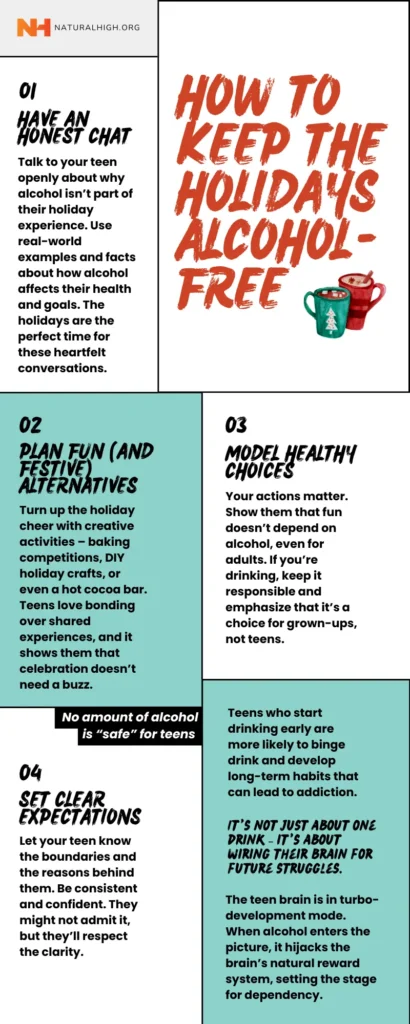With the holiday season in full swing, let’s chat about something super important – why teens and alcohol are a no-go during the festive times (and really, any time).
The festive season often brings with it a relaxed attitude towards alcohol, sometimes extending to teenagers. However, many studies have highlighted the detrimental impact of early alcohol consumption on adolescents.
Let’s break down why it’s so important for teens to avoid alcohol and the research to back it up. You’ll also find simple, actionable tips to help you guide your teen toward healthier, substance-free choices. We’ve also included a printable, 1-page PDF you can download for quick reference at the end of this article.
Why Some Parents Might Say ‘Yes’ to a Holiday Cheer with Their Teens
First off, you might wonder why some parents are cool with their teens sipping a drink or two. Here’s the lowdown:
- Cultural or Family Traditions: In some cultures or families, consuming alcohol is seen as a rite of passage or a part of family gatherings and celebrations.
- Perceived Safety: Parents might believe that it’s safer for their teens to experiment with alcohol under their supervision rather than in unsupervised settings where there might be less control over consumption.
- Misconception About Building Tolerance: Some parents think that introducing alcohol at a young age can help their children build tolerance or teach them how to drink responsibly.
- Peer Pressure and Social Norms: Parents themselves might feel pressure from social or peer groups to allow their teens to drink, especially in social settings where other teens are drinking.
The Startling Stats and Harsh Realities
- Early Drinking, Bigger Problems: Studies are clear – teens who start drinking early are walking a dangerous path. One study from PubMed revealed that teens who begin drinking are more likely to end up binge drinking and consuming larger amounts of alcohol. This isn’t just a holiday issue; it’s a life-changing one.
- The Brain and Booze: The Hazelden Betty Ford Foundation highlights how alcohol messes with the developing teen brain. Alcohol hikes up dopamine, but not in a good way. It takes over the brain’s natural pleasure paths and can lead to addiction. Plus, the teen brain is like a live wire – more sensitive, more reactive, and more vulnerable to the effects of alcohol.
- Long-term Damage: We’re not just talking hangovers. Alcohol can lead to serious health issues like liver damage and heart problems. This isn’t about one drink; it’s about a pattern that can harm their health for years to come. As researchers reported in 2019, “Using drugs and alcohol at an early age has been associated with multiple problems later in life such as negative health, social, and behavioral outcomes…early substance initiation has been identified as a [Risk Factor] for injection drug use, binge drinking, hazardous levels of alcohol consumption and drug use.”
The Myths vs. The Facts
- Myth: “One small drink is fine. It’s just the holidays.”
- Fact: Every drink can impact a teen’s health and well-being. The risks don’t take a holiday break.
- Myth: “Drinking at home with me is safe.”
- Fact: No environment makes early drinking safe. The risks remain, wherever they take that first sip.
4 Ways to Keep the Holidays Alcohol-Free for Teens

While adults might partake in holiday cheers, it’s crucial to keep our teens alcohol-free.
How Can Parents Help Prevent Underage Drinking?
Here’s how to make it happen:
- Honest Holiday Chats: Use the holiday gatherings as a chance to chat with your teen about why alcohol is off-limits for them, even during special occasions. Share your concerns and the specific risks associated with teen drinking.
- Festive Alternatives: Get creative with holiday fun that doesn’t involve alcohol. Plan family activities or games, bake festive treats, or have a movie marathon – anything that makes the season special without the need for alcohol.
- Lead by Example: Show your teen that the holiday spirit isn’t about what’s in your glass. If you choose to drink, do so responsibly and emphasize that this is an adult choice, with different impacts on adults and teens.
- Set Clear Holiday Rules: Be clear about your expectations regarding alcohol use during the holidays. Make sure your teen knows that the rules are different for them and why this is the case. A consistent, understood boundary can make all the difference.
With these strategies, you can navigate the holiday season, ensuring your teens understand the importance of staying alcohol-free.
A great way to help teens make healthy choices is by showing them relatable role models who’ve been in their shoes. For example, in Mike Conley Jr.’s Natural High Storyteller video (3 minutes) he talks about handling peer pressure to use substances. It can really hit home for them.
When teens see someone they admire share how they stayed true to their values, it makes a lasting impact. Psychologists call this “modeling,” and it’s a powerful tool—teens are more likely to follow the lead of someone they respect. Sharing a video like this not only opens the door to meaningful conversations but also inspires teens to embrace their own natural high and make substance-free choices.
As we celebrate and make memories, let’s ensure our teens are part of the joy – safely and soberly. The data doesn’t lie. Alcohol and teens are a risky mix, holiday or not. As parents, guardians, and educators, it’s our responsibility to protect adolescents from these dangers and encourage them to find joy and fulfillment in healthier, safer ways. This holiday season, let’s commit to supporting our teens in making choices that promote their well-being and future success.



